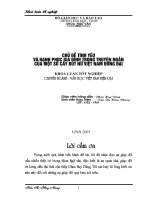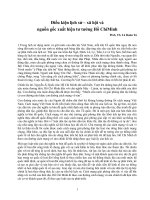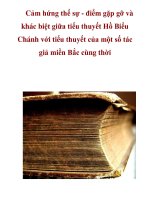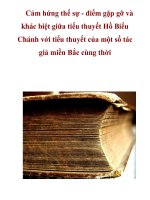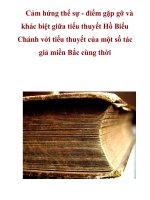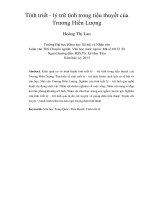Khía cạnh lịch sử, xã hội và triết học phản ánh trong tiểu thuyết của một số nhà văn châu Phi
Bạn đang xem bản rút gọn của tài liệu. Xem và tải ngay bản đầy đủ của tài liệu tại đây (5.56 MB, 233 trang )
Header Page 1 of 89.
BATANGASSTATEUNIVERSITY
Republic of the Philippines
THAINGUYENUNIVERSITY
SocialistRepublic of Vietnam
HISTORICAL, SOCIOLOGICAL AND PHILOSOPHICAL
DIMENSIONS REFLECTED IN THE NOVELS OF SELECTED
AFRICAN WRITERS
A Dissertation
Presented to the
Faculty of the GraduateSchool
BatangasStateUniversity
BatangasCity
In Partial Fulfillment
of the Requirements for the Degree
Doctor of Philosophy in English Language and Literature
by
NGUYEN THI MINH LOAN (SUMMER)
2015
Footer Page 1 of 89.
Header Page 2 of 89.
Footer Page 2 of 89.
Header Page 3 of 89.
i
THAINGUYENUNIVERSITY
SocialistRepublic of Vietnam
BATANGASSTATEUNIVERSITY
Republic of the Philippines
TABLE OF CONTENTS
Page
TITLE PAGE ...............................................................................................
APPROVAL SHEET ...................................................................................
ABSTRACT ................................................................................................
ACKNOWLEDGMENT ...............................................................................
DEDICATION .............................................................................................
TABLE OF CONTENTS ......................................................................................... i
CHAPTER I: THE PROBLEM ............................................................................... 1
Introduction ........................................................................................ 1
Statement of the Problem .................................................................. 7
Scope, Delimitation and Limitation of the Study ................................ 8
Significance of the Study ................................................................. 10
CHAPTER II: REVIEW OF LITERATURE......................................................... 14
Conceptual Literature ...................................................................... 14
Literature and Philosophy of Life ..................................................... 14
Significant Works of African Writers ................................................ 23
Literary Techniques ......................................................................... 30
Critical Approaches for Novel Analysis ........................................... 32
Research Literature ......................................................................... 37
Footer Page 3 of 89.
Header Page 4 of 89.
ii
THAINGUYENUNIVERSITY
SocialistRepublic of Vietnam
BATANGASSTATEUNIVERSITY
Republic of the Philippines
Synthesis of the Literature Reviewed ............................................. 45
Theoretical Framework ................................................................... 48
Conceptual Framework ................................................................... 54
Definition of Terms .......................................................................... 57
CHAPTER III: RESEARCH METHODOLOGY ................................................ 60
Research Design ............................................................................ 60
Treatment of Materials .................................................................... 62
CHAPTER IV: ANALYSIS AND INTERPRETATION ...................................... 65
CHAPTER V: SUMMARY, CONCLUSION AND RECOMMENDATION.... 179
Findings .........................................................................................180
Conclusion .....................................................................................189
Recommendations .........................................................................190
BIBLIOGRAPHY ................................................................................................ 222
Footer Page 4 of 89.
Header Page 5 of 89.
1
THAI NGUYEN UNIVERSITY
Socialist Republic of Vietnam
BATANGAS STATE UNIVERSITY
Republic of the Philippines
CHAPTER I
THE PROBLEM
Introduction
There is a close link between philosophy and literature. While
philosophy supplies ideology and themes for literature, literature, on the
other hand, provides vivid illustrations of the meaning and abstract
thought of philosophy. Literature is considered as a channel to show the
author’s philosophy of life. Indeed, in literature the philosophical theme
is conveyed through literary works and is an essential part of their
aesthetic value. There is a considerable number of well-known works in
the world literature in which philosophical views are put forward,
suggested, or play a central role such as Dostoyevsky’s Brothers
Karamazov, Crime and Punishment, and The Idiot; Tolstoy’s War and
Peace; Proust’s In Search of Lost Time; Mann’s MagicMountain, etc. By
studying literary works, readers are introduced central philosophical
issues relating with freedom, responsibility, religious belief, personal
identity, etc.
Footer Page 5 of 89.
Header Page 6 of 89.
THAI NGUYEN UNIVERSITY
Socialist Republic of Vietnam
2
BATANGAS STATE UNIVERSITY
Republic of the Philippines
Beside reflecting on philosophy, literature also reflects the historical
and sociological dimensions of the society. That literature is a reflection
of the society has been widely acknowledged. Literature influences the
society, and the society is reflected in literature; therefore, there has
been a close interaction between them. The readers can explore a
variety of historical and socio-political themes in many works of famous
writers such as colonialism, post-colonialism, morality, racial identity,
oppression, politics, leadership, gender issues, war, etc. According to
Diamond (1989), a literary work can provide a more detailed picture of a
society in terms of cultural, social, religious, and political dimensions
more than any history textbooks and anthropological records do. This is
exemplified in the works of many world famous writers. For example,
Wordsworth creates wonderful poems to praise humanitarian aspect of
the French revolution in the earlier phase, but later his poetry focuses on
its bloodiness and violence. Another example is Charles Dickens’ novels
whose themes consist of the consequences of industrialization like the
sufferings of the poor, hypocrisy of the privileged class, government
corruption, and many others.
Africa experienced a variety of cultural clashes and political crises
from the early colonial days when the Europeans came and conquered
this continent. Achebe, a Nigerian writer, wrote that the time and place in
Footer Page 6 of 89.
Header Page 7 of 89.
THAI NGUYEN UNIVERSITY
Socialist Republic of Vietnam
3
BATANGAS STATE UNIVERSITY
Republic of the Philippines
which he was raised was “a strongly multiethnic, multilingual, multireligious, somewhat chaotic colonial situation” (Achebe, The Education
of a British-Protected Child: Essays, 2009, p.39). These words describe
Nigeria in particular and other countries in Africa in the period from the
end of the 19th century to the 21st century.
For the countries in Africa, the experience of colonialism is
considered as the one of the most important factors in understanding the
present condition of the African continent, the African people and their
history. Therefore, a close examination of the phenomenon of
colonialism is essential to assess not only the economic and political
development in Africa but also the African people’s perception of
themselves.
African literature has increasingly gained much interest in literary
research for the last three decades. Many critics have devoted much
energy to identify western influence on modern African literature.
However, the concept of influence have been subject to re-evaluation
and revision because critics often impose Western norms on analyzing
African literary works in terms of themes, techniques of writing,
philosophy, etc. While these studies have made insight interpretations of
content and meaning of the African works, less is known of the influence
Footer Page 7 of 89.
Header Page 8 of 89.
THAI NGUYEN UNIVERSITY
Socialist Republic of Vietnam
4
BATANGAS STATE UNIVERSITY
Republic of the Philippines
of the African traditional roots on African literature and the influence of
African writers as philosophers on African people’s perception.
From the beginning of colonial situation, literature was the sharp
weapon of African writers to oppose colonialism and proudly assert the
values of the cultures that the colonials had tried to destroy. Fictional
works in many African nations has been very much influenced by the
cultural and political experiences of the country. Therefore, many of
African writers chose to use their works to explore, portray, and expose
these social experiences in their different works. As Ojaide states, “there
is, culturally speaking, no art for art’s sake in Africa. Every literary work
has a social function” (Ojaide, Modern African Literature and Cultural
Identity, 1992, p.44). Among African writers, Chinua Achebe, Ayi
Kwei Armah and Tsi-tsi Dangarembgaare the pioneers in using the pen
as the weapon against colonialism.
Chinua Achebe defines his writings as part of a “process of restoring peoples who had been knocked silent by the trauma of all kinds
of dispossession” (Achebe, Home and Exile, 2000, p.79). Achebe takes
up the responsibility as an Igbo writer who is to help his people regain
belief in itself and dignity that is destroyed by Western colonialism.
Ayi Kwei Armah is undoubtedly one of the most excellent writers of
the second generation of African writers which comes after Achebe. In
Footer Page 8 of 89.
Header Page 9 of 89.
THAI NGUYEN UNIVERSITY
Socialist Republic of Vietnam
5
BATANGAS STATE UNIVERSITY
Republic of the Philippines
an autobiographical article, “One Writer's Education” (West Africa,
1985), Armah described himself as not simply a Ghanian and a West
African but “ most significantly as an African”. One of the strengths of his
writing is his use of African history and myths to emphasize the
originality and complexity of African cultures before the incursion of
colonialism into the continent. His writings are realistic descriptions of
the African continent in such a way that his novels can be seen as a
sociological report on the social and politcal situation of Africa.
Tsi-tsi Dangarembga is a fabulous African female writer. Her
writings transmit political messages regarding female oppression and
colonial domination. She earned much praise from literary critics
because of her complex depiction of racial and gender struggles in a
rural African society.
Therefore, the researcher intended to analyze the three novels by
Achebe, Armah and Dangarembga respectively: No Longer at Ease
(1960), Fragments (1971) and Nervous Conditions (1988) because an
exploration of the three chosen writers of the three different African
countries (Nigeria, Ghana and Zimbabwe) and of two sexes would
reveal a number of common concerns in terms of historical, sociological
and philosophical dimensions. The historical basis for this search is that
throughout Africa there are close similarities in both traditional cultures
Footer Page 9 of 89.
Header Page 10 of 89.
THAI NGUYEN UNIVERSITY
Socialist Republic of Vietnam
6
BATANGAS STATE UNIVERSITY
Republic of the Philippines
and contemporary situations. The researcher attempted to make
comparisons and drawing parallels among these novels by Achebe,
Armah and Dangarembga in oder to generalize the whole Africa.
The wisdom embodied in the selected works of these African
writers could be one of the motivating factors that could help readers in
the world understand about internal and external pressures African
people suffered as well as the values they lost in colonial and postcolonial periods. Therefore, the readers may establish their high
appreciation of African culture and history.
Besides, many scholars have already studied the various themes of
No Longer at Ease, Fragments and Nervous Conditions such as
classes, cultures, corruption, etc. However, there is not much analysis
on the historical, social and philosophical insights of these novels. Also,
these African writers’ philosophy of life gleaned from the three novels
has not received enough attention from the literary circles.
Last but not least, Achebe, Armah and Dangarembga’s life, works
and life philosophy exemplify noble values of a person and a nation,
which is worthy of attention. Therefore, as a teacher, the researcher
would like to expose her students to literature and culture outside of an
Eastern country. She wants her students to gain an appreciation of a
foreign culture while also gaining insight into their own culture, seeing
Footer Page 10 of 89.
Header Page 11 of 89.
THAI NGUYEN UNIVERSITY
Socialist Republic of Vietnam
7
BATANGAS STATE UNIVERSITY
Republic of the Philippines
their own society through a different and objective lense. Moreover, she
wants to equip her students with a sense of values to guide and allow
them to embrace a good philosophy of life and clarify life goals.
With this objective in her mind, the researcher was deeply
motivated to explore and undertake an analysis of how historical,
sociological, philosophical perspectives reflected in the selected works
to bring out the philosophy of life of Achebe, Armah and Dangarembga.
Statement of the Problem
This study primarily aims to analyze the historical, sociological,
philosophical dimensions in the novels of selected African writers.
Specifically, the study answered the following questions:
1. What historical events are reflected in the novels of Chinua Achebe,
Armah and Dangarembga?
2. How do the novels convey the sociological character of the time as
regards:
2.1. religious practices;
2.2. social practices;
2.3. educational practices; and
2.4. political practices?
Footer Page 11 of 89.
Header Page 12 of 89.
THAI NGUYEN UNIVERSITY
Socialist Republic of Vietnam
8
BATANGAS STATE UNIVERSITY
Republic of the Philippines
3. What literary techniques are utilized to highlight African way of life in
terms of:
3.1. Symbolism;
3.2. Flashback;
3.3. Foreshadowing;
3.4. Figures of speech?
4. What literary approaches are prevalent in the treatment of the
selected novels?
5. What philosophy of life of the writers may be gleaned from the
analyses of the novels?
Scope, Delimitation and Limitation of the Study
This study analyzed the historical, sociological and philosophical
dimensions embodied in Achebe, Armah and Dangarembga’s selected
literary pieces pointing out their philosophy of life. Likewise, this paper
tries to present the historical events, sociological character of the time,
the literary devices and literary approaches used in unveiling these
African writers’ philosophy of life.
This study employed the qualitative method of research in
analyzing the authors’ philosophy in the representative literary works
chosen. Likewise, this analysis made use of the historical, sociological
and philosophical approaches as the bases for analysis. In particular,
Footer Page 12 of 89.
Header Page 13 of 89.
THAI NGUYEN UNIVERSITY
Socialist Republic of Vietnam
9
BATANGAS STATE UNIVERSITY
Republic of the Philippines
the historical and the sociological approaches are supported by the
theory of Postcolonialism and Cultural Relativism while Frankl’s Theory
on the Meaning of Life was used to investigate Achebe, Armah and
Dangarembga’s life philosophy behind their writing. Other approaches in
literary criticism that may be employed in the analysis like the
biographical criticism and psychological criticism are not part of this
study.
This paper also involved content analysis, which is a systematic
technique in analyzing message content and message handling. The
data analysis in this research centered on data seeking and the
extraction of meaning from Achebe, Armah and Dangarembga’s
selected literary works. Much effort was focused on the task of recording
data or making notes through concepts and categories; linking and
combining abstract concepts; extracting the essence; organizing
meaning; writing an understanding; and drawing conclusions.
The essential features in the treatment of materials were
considered by the researcher in the conduct of this study. The general
rules cited by Alkiere (2014) as regards the four standards a piece of
literature particularly that of a novel should abide to in order to be
considered literary guided in the selection of works under study.
Footer Page 13 of 89.
Header Page 14 of 89.
THAI NGUYEN UNIVERSITY
Socialist Republic of Vietnam
10
BATANGAS STATE UNIVERSITY
Republic of the Philippines
The representative literary works were analyzed: No Longer at
Ease by Achebe, Fragments by Armah and Nervous Conditions by
Dangarembga. The said selections were chosen because of the
correlation between the aforementioned themes, literary devices and
approaches which helped in unveiling the authors’ philosophy of life.
Typical for African novels, No Longer at Ease, Fragments and Nervous
Conditions address the cultural and social changes in African society.
They illustrate the effects of the social, economic and political situation
on the behavior and mental conditions of the characters. Although these
novels have been the subject of much critical study and debates within
and outside the literary circles, but enough attention has not been paid
to a study of these novels to bring about Achebe, Armah and
Dangarembga’s philosophy of life.
Significance of the Study
The germaneness of literary analysis as a vital part of a research
study is emphasized in terms of its implication to a number of
individuals. Therefore, it is vital to spell out how this study is beneficial to
academic managers, working professionals, college instructors of
literature, students of literature, members of the community, and other
researchers.
Footer Page 14 of 89.
Header Page 15 of 89.
THAI NGUYEN UNIVERSITY
Socialist Republic of Vietnam
11
BATANGAS STATE UNIVERSITY
Republic of the Philippines
Academic Managers. This paper will help them include
developmental priorities, programs, projects and policies in the
educational institutions to ensure that literary appreciation and critiquing
may be integrated in the academe. This will also inspire them to spawn
activities related to humanizing education through the study of literature
in the curricula that will educate the academic community about the
study of literature which is about human being: their daily lives as well as
their exceptional, towering experiences.
Working Professionals. This study will be beneficial for them in
the sense that at whatever circumstance they may find themselves their
own philosophy of life from their readings of the selected works. These
works humanize as they educate them in the art of living. At their
maturity these professionals reminisce their past and realize that their
readings have broadened and revitalized their life. It has given a deeper
meaning to their existence. Likewise, they may be inspired to highly
appreciate the folklore and culture in the past and their roles in affirming
the dignity of their people. These initiatives may help these working
people to embrace a good philosophy of life, clarify life goals, and
revitalize working relationships within their workplaces.
College Instructors of Literature. This dissertation will be helpful
in the instructor’s methodology in teaching literature as an inquiry into
Footer Page 15 of 89.
Header Page 16 of 89.
THAI NGUYEN UNIVERSITY
Socialist Republic of Vietnam
12
BATANGAS STATE UNIVERSITY
Republic of the Philippines
using the appropriate literary theories and approaches in literary
analysis. This will lead to treating literary criticism as a worthwhile
exercise that includes, among others, the identification of a meaningful
theme and the investigation of devices and approaches to reveal such
themes. In addition, this will provide them with opportunities to touch the
concept of historical, sociological and philosophical dimensions in
selected works in their literature classes and open their students’ mind
and hearts to the philosophy of life of the author that may be drawn from
them.
Students of Literature. This study will give them an extensive and
profound outlook in life as regards the historical, sociological, and
philosophical dimensions of literature through the lives and experiences
of the characters in the selected literary pieces. It will also make them
realize that literature may be the writers channel for philosophical human
transformation. In addition, this paper will make them treat literature as a
work of art distinguished from other texts through content and form, and
eventually intensify their appreciation of novels and inspire them to
engage in literary analysis as an academic activity.
Members of the Community. This paper will make them more
mindful of their social responsibility in the community. This will make
them understand that some of the belief systems and practices at home
Footer Page 16 of 89.
Header Page 17 of 89.
THAI NGUYEN UNIVERSITY
Socialist Republic of Vietnam
13
BATANGAS STATE UNIVERSITY
Republic of the Philippines
and the community do not often help in establishing equal and valued
roles for young students, and thus should be sidestepped.
Other Researchers. Researchers will be benefitted by this study
through the analysis and treatment of materials, and through the careful
investigation of both theme and form in literary genres. Likewise, this
paper will enlighten them on the process of drawing out literary theories
and utilizing critical approaches in literary analysis.
Footer Page 17 of 89.
Header Page 18 of 89.
14
THAI NGUYEN UNIVERSITY
Socialist Republic of Vietnam
BATANGAS STATE UNIVERSITY
Republic of the Philippines
CHAPTER II
REVIEW OF LITERATURE
This chapter presents the review of literature that is critical in the
establishment
of
concepts
and
theories
that
would
effectively
substantiate the study.
Conceptual Literature
The review of conceptual literature yields four constructs, which
may be used in the analysis and interpretation of the works dissected.
These constructs include: literature and philosophy of life, significant
works of African writers, literary techniques and critical approaches in
novel analysis.
Literature and Philosophy of Life
It is widely acknowledged that literature reflects society and depicts
human life. According to Plato, literature imitates life, that is, it
represents the world as it is. As an imitation of human action, literature
presents a picture of what people think, say and do in the society
Footer Page 18 of 89.
Header Page 19 of 89.
THAI NGUYEN UNIVERSITY
Socialist Republic of Vietnam
15
BATANGAS STATE UNIVERSITY
Republic of the Philippines
through characters who convey certain messages for different purposes
through their words and actions. A literary piece is based on authors’
intention and includes the attitudes, morals and values of the society
because no writer can live out of the world around him. Tomeldan, et. al.
(1986) also said that literature is a product of life and about life. It offers
an experience in which people can participate as they read and test
what they read by their own experience. By reading literature, people
can get something of value such as an understanding, a new
awareness, a feeling of pleasure, etc. In essence, life illuminates
literature as much as literature illuminates life.
Besides, writers create characters with their words, actions and
reactions to convey certain messages for the purpose of education,
information and entertainment. It is not possible to find a work of
literature without any attitudes, morals and values of the society.
Therefore, literature is one of the best media people can use to
understand their society and even themselves.
There are different forms of literature among which writers can
choose one suitable for his needs and intention such as essays, short
stories, dramas, or novels. However, in terms of representation of
different aspects of the society’s life, novels becomes increasingly
popular compared with other forms of literature.
Footer Page 19 of 89.
Header Page 20 of 89.
THAI NGUYEN UNIVERSITY
Socialist Republic of Vietnam
16
BATANGAS STATE UNIVERSITY
Republic of the Philippines
One reason is their expansion of social scope. It means that novels
most addressed the domestic and social concerns of different classes in
the society, even the middle and working classes. A good illustration is
Leo Tolstoy’s War and Peace, which consists of nearly six hundred
characters of different classes from the aristocracy to the poor.
Besides, novels engage the readers’ thought and immerse them in
the world of ideas and themes. Indeed, each novel consists of a variety
of subjects of social significance such as class, race, politics,
economics, etc. In terms of the writer’s choice of materials, the novels
may be psychological, historical or social in content. A good example is
Stowe’s Uncle Tom’s Cabin and Sinclair’s The Jungle. Other novels are
personal or psychological regarding human relationship, conflicts,
desires, and fears like Charlotte Bronte’s Jane Eyre or William
Makepeace Thackeray’s Vanity Fair.
Another explanation for the popularity of novels is the range of the
kinds of novels- scientific fiction, adventure, detective, romantic, etc.
Hence, writers are free to choose his favourite form to express his
intentions and purposes. Mark Twain's Adventures of Huckleberry Finn
is a good example of adventure novels.
Furthermore, a novel is long enough for writers to describe fully the
world around them and to create a large number of incidents where
Footer Page 20 of 89.
Header Page 21 of 89.
THAI NGUYEN UNIVERSITY
Socialist Republic of Vietnam
17
BATANGAS STATE UNIVERSITY
Republic of the Philippines
characters can express their personality, a more complicated plot, a
more elaborative use of setting and a greater complexity of themes. It is
capable of revealing both a broader and deeper view of human nature
and human experience.
Last but not least, novels can reveal the spirit of the times so subtly
that they have potential for shaping the consciousness of hundreds of
generations. F.Scott Fitzgerald’s The Great Gatsby and Graham
Greene’s The Quiet American are typical illustrations.
Hence, novels help readers understand social realities in different
periods of time. To do this, a writer should interpret the world and even
himself to transfer his ideas to his readers and inspire, guide and
challenge them.
Novels commonly trace the depth of an individual, a group of
people, or a world. Novelists make a work of art and offer both a
representation of and a response to reality. For example, the African
novels shared a similar theme of reaction to the negative views about
the history of Africa and Africans. The writers aim to reconstruct and
assert the true cultural identity of the African people and assure them
“that their past with all its imperfections was not one long night of
savagery from which the Europeans acting on God’s behalf delivered
them” (Achebe, The Novelist as Teacher, 1988). Besides, Said has
Footer Page 21 of 89.
Header Page 22 of 89.
THAI NGUYEN UNIVERSITY
Socialist Republic of Vietnam
18
BATANGAS STATE UNIVERSITY
Republic of the Philippines
deeply explored the role of the novel in the colonial and imperial
enterprise of Western colonialism. He argues eloquently that “stories are
at the heart of what explorers and novelists say about strange regions of
the world, they also become the method colonized people use to assert
their own identity and the existenceof their own history” (Said, Culture
and Imperialism, 1993, p.xii). This approach appears in the works of
African writers such as Achebe, Ngugi wa Thiong’o, Elechi Amadi, Alan
Paton, and Camara Laye.
The present study follows the notion that “literature has no
autonomy outside reality” and that its analysis aims “to show the literary
work as a significant statement with a direct relevance to the African
experience” (Irele, The Criticism of Modern African Literature, 1971,
p.41). The novel’s capacity to map and reorganize reality has made it
the most convenient medium for African writers seeking to rethink their
social worlds intransitional and postcolonial times.
To sum up, novels are one of the best tools for writers to reflect any
changes of the society and the writer’s intentions. Writers like Achebe
have shown that the role and function of novels must change to suit the
cause of the user. Therefore, the notion that a novel is a reflection of
social reality is a highly acknowledged medium in the analysis of the
historical, sociological and philosophical perspectives of Achebe, Armah
Footer Page 22 of 89.
Header Page 23 of 89.
THAI NGUYEN UNIVERSITY
Socialist Republic of Vietnam
19
BATANGAS STATE UNIVERSITY
Republic of the Philippines
and Dangarembga’s novels, No Longer at Ease, Fragments and
Nervous Conditions.
Philosophy of life may be defined as an overall vision or attitude
toward life and the purpose of life. There are some ways of
understanding philosophy of life.
The first viewpoint by Peck (in Schmidt, 2002), a contemporary
psychiatrist, explains that people need a “map” to find their way through
life. Maps do not exist naturally; therefore, if people want to have their
maps, they have to create their own maps, which requires great effort.
The more effort they spend appreciating and perceiving reality, the
larger and more accurate their maps will be. Some people stop making
it early, so their maps are small and sketchy. Only a small number of
people continue making their maps until they die; therefore, their maps
are enlarged, refined and redefined. The philosophers affirm that people
should revise their maps continually because the world always changes.
The second viewpoint is from the ancient philosopher Plato (in
Schmidt, 2002). He uses the cave to illustrate his belief that people are
trapped by their imperfect, subjective impressions of the world. People
need to use their reasoning abilities to escape from this trap and to find
a more accurate understanding of themselves and their world.
Footer Page 23 of 89.
Header Page 24 of 89.
THAI NGUYEN UNIVERSITY
Socialist Republic of Vietnam
20
BATANGAS STATE UNIVERSITY
Republic of the Philippines
In the third viewpoint, Keen and Valley-Fox (in Schmidt, 2002)
explain that people need a “myth” to explain their lives, which is similar
to Peck’s concept of a map which guides their culture, families, and
even their individual lives. The authors explain that all humans need a
myth, which puts life together into a meaningful whole.
Whether philosophy is consciously or unconsciously adopted or
followed in life, a fundamental philosophy is constructed as the basis of
one’s own life, which shapes his whole attitude to life. Therefore, all
people live in accordance with the philosophy of life that they have
framed for themselves. Even those who claim that there is no need of
any philosophy or the uneducated have a philosophy of their ownthough
it may be only a superstitious belief in God or Buddhist. Therefore, it is
certainly essential for people to frame a philosophy for their lives.
Philosophy is a complete world-view and a general attitude to life. It
gives an explanation of the universe, always the deepest of known facts.
Philosophy is harmoniously related to the other views of life and fulfils
the needs of man to the highest degree of satisfaction. Philosophy
makes a person strong to criticize his outlook, stand firm on his own legs
and assert his rightful citizenship of the universe. Philosophy makes him
free in his attitudes.
Footer Page 24 of 89.
Header Page 25 of 89.
THAI NGUYEN UNIVERSITY
Socialist Republic of Vietnam
21
BATANGAS STATE UNIVERSITY
Republic of the Philippines
Sivananda’s philosophy of life is a good example. According to him,
philosophy is not merely a logical study of the conclusions of science or
a synthesis of the different sciences. As a follower of the philosopher
Sankara, Sivananda builds his philosophy on a life of experience first
and reason afterwards. His method is a very peaceful and harmonizing
one; his philosophy is universal in its scope. Therefore, his philosophy
contains friendliness and joy. Whether philosophy is achieved
consciously by understanding, by faith, habit, or tradition, it is the
method of right living and of directing the life towards a higher state of
existence. His philosophy is the principle of rational guidance in
everyone’s life, so it is valuable. The most unique feature in his teaching,
which he always made good examples through his daily life, is that no
part of experience of life is neglected. A philosophy which overlooks
some aspects of life is partial and incomplete and therefore not worthy of
being regarded as a science of life.
In trying to shape mankind’s ideas, both philosophy and literature
have moral influence on human behavior. Ethics, a core branch of
philosophy, is concerned with questions of human conducts and
evaluations of conducts with a view to the attainment of a good life. One
of the reasons why great works of literature are considered great is their
moral values. For instance, Tutuola’s The Palm-Wine Drunkard and
Footer Page 25 of 89.

